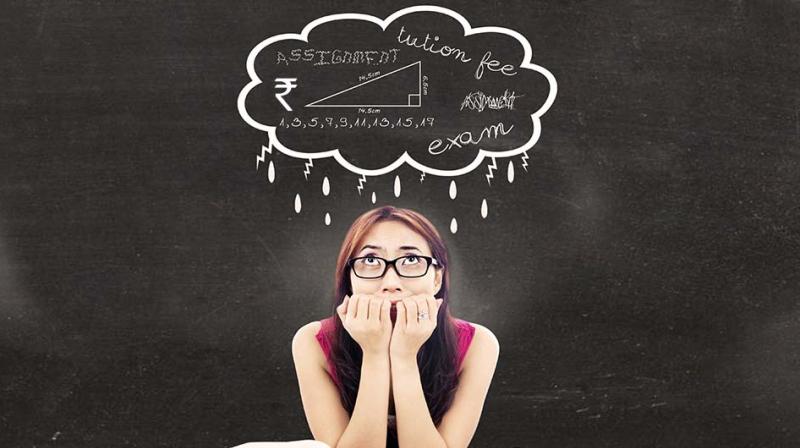None to track students' trauma

THIRUVANANTHAPURAM: A tenth standard student's desperate act from the third floor at Trinity Lyceum in Kollam on Friday indicates rising incidents of juvenile distress and their failure to cope with stress points while it also exposes the absence of proper institutional support systems in educational institutions.
What's apparently flimsy to others often happens to be a question of life and death for those children, who have infantile notions of success/failure and approval/disapproval by peer groups.
But in schools teachers fail to notice distress symptoms among students. Many ignore what are seemingly students' tantrums. Poor scorers are condemned to back benches by teachers, little realizing they have innate potential for greatness, though marred by growing-up issues.
Many children simply wouldn't appreciate the very need for studying and fail to fathom parental pressure to perform. They end up being reactive than proactive.
Experts say one way out is to train teachers to spot students, who exhibit features of psychiatric deficit. However, one should not forget the fact that even clinicians fail to diagnose symptoms of mental distress.
Psychologist Aravind Thampi pointed out that appointing counsellors in
schools are not the way out. There is always the stigma attached to those seeking counselling. The best way is to equip teachers themselves to provide psychological help. Teachers have to be given proper training to guide students cope with mental distress, Mr Thampi said.
Many teachers show over-enthusiasm while dealing with students who need psychological support. This does more harm than good, said Mr Thampi.
It is true, that the number of students who attempt suicide is very high. However, the success rates among students who attempt suicides are much less, Mr Thampi said.
Teachers in private schools miss are underpaid and overburdened that they have less time to devote to extra-curricular student care.
Kerala CBSE School Management Association president TPM Ibrahim Khan claims that CBSE schools have counsellors appointed to look into emotional and mental distress but the grassroots reality is the very opposite. Facilities were grossly inadequate.
In this context, the High Court in 2012, asking the CBSE to enforce as a condition for affiliation payment by the managements of minimum monthly provisional salary of Rs 10, 000 for primary and middle school teachers, Rs 15,000 for secondary school teachers, and Rs 20,000 for senior secondary teachers is significant.
District Child Protection Officer K Subair said teachers in select higher secondary schools are being trained to help students cope with with mental distress. Services of Bengaluru-based National Institute of Mental Health and Neuro Sciences (Nimhans) have been sought to develop training programmes, Mr Subair said.
Mr Azeem CM, coordinator of the Career Guidance Centre of the Higher Secondary Directorate, said that drop boxes have been placed at all 1,240 schools where Souhrida clubs have been formed. Complaints that need police intervention are forwarded. Those issues that can be redressed at school-level are recorded in the intervention register, said Mr Azeem.
‘Watch out for behavioural changes’
Depression is the actual problem but it is rarely detected. If adults go through depression they can verbally express the agony of the mind. The will speak or through actions or even convey to the mental health professionals about the changes occurring in them.
Among children depression is under diagnosed or not at all diagnosed. Many people don't even realize that the child could have a depressive episode. Like adults, child brain also goes through anxiety and depressive bouts.
"I have seen many children below ten years mainly between eight to ten, diagnosed with depression,'' said Dr Anish N.R.K , psychiatrist, Child Clinic , Government Mental Health Centre, Thiruvananthapuram.
How can one diagnose that a child has depression ?
"There is change in the behaviour of child. Some parents come to me saying their child is not happy these days. Not enjoying school, not keen on regular interests, earlier he used to switch on TV to watch his favourite programme but it does not generate same interest in him now. Showing no interest in reading, drawing, enjoy wearing new dresses and playing with friends. There's even loss of appetite," he said referring to some of the common symptoms presented at the clinic.
Dr Anish said if anger, mood swings persist for a longer period then one should be alert. “Changes should be made in family environment if required, sitting with psychologists and counsellors are other options. In cases of severe form of depression in which there is threat of child taking dangerous steps, medication is started without delay," he added.
"We advise parents to closely monitor behavioural pattern among child, recent changes if any.
“The change in behaviour can be observed easily. If it the pattern changes after short duration then there is nothing to worry. But if it persists beyond a point to the extent of affecting study and results, then it should be taken seriously.
Dr Anish who has developed an Android app called 'Parenting Challenge', pointed out that with proper medication and counselling, the child could be normal in three to nine months time. In most cases with initial treatment the child becomes normal. "In my clinic less than five per cent cases are reported. But it is significant," he said.
TEACHERS’ ROLE
Teachers can play a significant role in monitoring the child as he spends more active time in schools. Teachers can look if the child is enjoying activities in school, is he joining others during lunch break and going out and playing and is he mingling with others. If the child is experiencing depression bout, then he would prefer to stay indoor even during break.
These are small indications that teachers have to look for and respond in time.
“It is important for parents to understand that it is easier to take remedial measures in the initial phase of depression. But most of the time parents come to us when the child has already developed self injurious behaviour. So, the earlier the better," he said.

